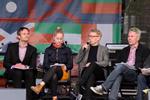Social Watch E-Newsletter - Issue 300 - June 2, 2017
Published on Fri, 2017-06-02 19:58
 |
| Issue 300 - June 2, 2017 |
|
| |
| |
|
| |
Finland discusses the 2030 Agenda and the role of business in it
|
| |
|
| |

Photo: Maailma kylässä
|
The follow-up report of Government's achievements in implementing the Agenda 2030 was published last weekend at World Village Festival in Helsinki.
Representatives of the CSOs handed over the reports to the Minister of Foreign Trade and Development, Kai Mykkänen and Minister for Housing, Energy and Environment, Kimmo Tiilikainen. A lively panel discussion together with representatives of different parliamentary parties was held. The amount of ODA -funding started a vivid debate. The cuts made from CSO funding were seen especially problematic. Minister Mykkänen made a promise to increase the ODA-funding after the huge cuts the current Government made at the beginning of its term of office.
The role of the private sector was seen differently between the politicians: Representatives of the Government emphasized its importance whereas the opposition saw also problems in concentrating to the business co-operation. Read more
|
| |
|
| |
|
| |
Social degradation in Syria: how the war impacts on social capital
|
| |
|
| |
 |
The Social Degradation Report explores the impact of the armed conflict in Syria on social relations. It uses the concept of social capital as an approach to analyse trust, cooperation, and shared values.
Direct violence –including displacement, involvement in violent acts, and discriminatory institutional practices– affects both bridging and linking social capitals. Development indicators such as health, education, and employment are strongly correlated with the shared values and attitudes component. While these indicators are not directly related to violence, they affect the cognitive aspect of a shared vision for the community and the country, and are important factors in building the future social contract. Moreover, the research shows that conflict economy and conflict-related deaths are the main determinants of feeling secured, while the trust between individuals is affected by conflict economy, discriminatory institutions, forced displacement, and loss of job opportunities.
The Syrian Centre for Policy Research (SCPR) launched its report “Social Degradation in Syria” in cooperation with the Issam Fares Institute for Public Policy and International Affairs (IFI) at the American University of Beirut (AUB) on June 1st. Read more.
|
| |
|
| |
|
| |
Funding Needs for UN’s 2030 Development Agenda
|
| |
|
| |
 |
As the United Nations assesses the implementation of its 2030 Agenda for Development, including its 17 Sustainable Development Goals (SDGs), the estimated funding needs keep skyrocketing — from the initial millions and billions to trillions of dollars annually.
The President of the General Assembly, Ambassador Peter Thomson of Fiji, said on April 18 that SDG financing, including the eradication of extreme poverty by 2030, is going to cost about $6 trillion annually — and then to a hefty $30 trillion through 2030.
At the same time, the Addis Ababa Action Agenda (AAAA), which outlines the implementation of the 17 SDGs, points to an infrastructure gap of some $1 trillion to $1.5 trillion annually in developing countries, while estimates of the global gap generally range from $3 trillion to $5 trillion annually.
But the international community – and specifically the least developed and developing countries – is unlikely to succeed in raising the funds needed to achieve the UN’s ambitious goals, including lifting some 550 million people out of poverty. Read more.
|
| |
|
| |
|
| |
Health: WHO DG-elect faces herculean task on "Health as Rights issue"
|
| |
|
| |
As climate change and neo-liberal economic policies wreak havoc by increasing the disease-burden in the poorest and developing countries, the newly-elected director-general of the World Health Organization (WHO), Dr Tedros Adhanom Ghebreyesus from Ethiopia, faces a herculean task in advancing his goal that "health is a rights issue" and "an end in itself."
Last May 23, Dr Tedros, a malaria expert, secured the distinction of being the first African candidate to be elected to the WHO's top job. He is also the first democratically-elected director-general through a secret ballot. Read more.
|
| |
|
| |
Check out new web feature
"Global Policy Watch Notice Board" for updates on current affairs of the United Nations in New York
|
| |
|
|
|
| |
|
SOCIAL WATCH IS AN INTERNATIONAL NGO WATCHDOG NETWORK MONITORING POVERTY ERADICATION AND GENDER EQUALITY Social Watch >>
Social Watch E-Newsletter For comments, sugestions, collaborations contact us at: socwatch@socialwatch.orgTo stop receiving this newsletter send a message with the subject "unsubscribe" to: socwatch@socialwatch.org |
|
|
|
|
